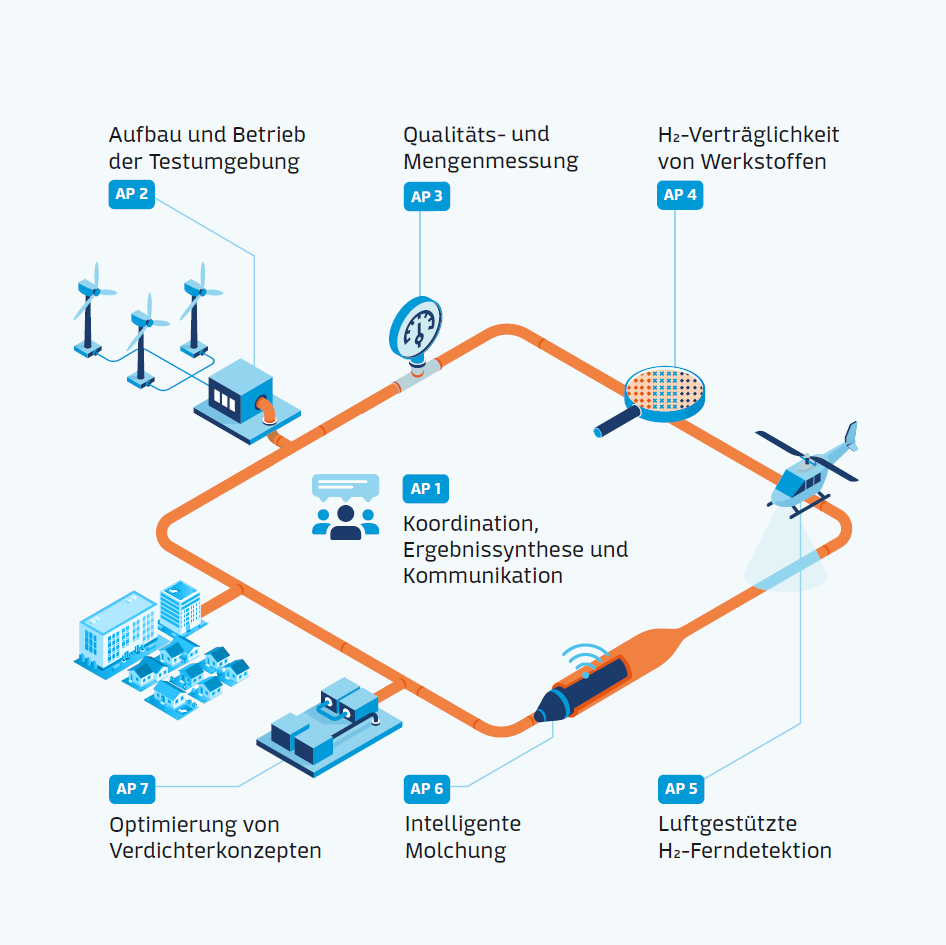Hydrogen
Verify quality reliably and independently
Energy transition, natural gas crisis, hydrogen — everything is connected, and nothing is more present in today’s public news especially in the natural gas industry. Every new political decision every step forward raises new questions. On hydrogen, everyone has an opinion, and everyone participates in the public debate. Little is clear except that hydrogen will continue to grow significantly in importance as energy storage and energy carrier in the near future.
 Today nobody knows where this will lead and how the hydrogen will be used, mixed gas, natural gas and hydrogen parallel infrastructure, only hydrogen, for heating, for hydrogen engines or fuel cells, for the chemical industry, for methanation. However, one thing is quite certain, measuring instruments will be needed that can analyze the hydrogen.
Today nobody knows where this will lead and how the hydrogen will be used, mixed gas, natural gas and hydrogen parallel infrastructure, only hydrogen, for heating, for hydrogen engines or fuel cells, for the chemical industry, for methanation. However, one thing is quite certain, measuring instruments will be needed that can analyze the hydrogen.
For gas analysis, which is meterQ, this means the eternal discussion about whether a PGC should be able to measure 5%, 10% or 20% hydrogen in natural gas is outdated. In the transition phase that we are entering, devices are needed that can cover the entire range of 0% — 100% hydrogen. In addition to that, devices that measure the hydrogen quality. Whether the hydrogen originates from an electrolyzer or any other hydrogen source, whether the analyzer is used to assess how transportation in a pipeline affects gas composition, or whether it is used by a customer to make sure that he is getting the quality he needs or is paying for.
Today, many different parties are discussing threshold values. Thresholds for production, for transport, for use, and of course for billing. Does this make sense today? For the entire hypothetical hydrogen infrastructure, there is a lack of experience as to how the individual parts behave, which purity can be achieved with what effort, and what impurities must be considered – in short, there is a lack of experimental results of measurements! There is also a lack of measuring equipment to perform such measurements since the first pilot projects are now running.

Pioneers of hydrogen technology
As meter Q we are part of the German hydrogen lead project TransHyDE, which aims to explore and evaluate what options are available for hydrogen transport in the required quantities and over the required distances. With Get‑H2 we are involved in the subproject that focuses on the conversion of natural gas infrastructure (i.e. pipelines and storage facilities) to hydrogen use. For these investigations a test pipeline is being built.
The aim is to understand which materials are suitable to what degree, how such facilities and pipelines can be operated safely, what influence transport has on hydrogen purity, and much more. The result of this research will be the development of the necessary guidelines, regulations and standards that form the basis for the construction and operation of a hydrogen infrastructure in Germany.
 A high-precision measuring device
A high-precision measuring device
As experts in gas analysis, we can make a fundamental contribution to this. With our new development, the MGChydrogen, we supply the first measuring device that can measure hydrogen quality in the same way as natural gas. The primary objective is not to measure a calorific value approved by the calibration authorities, although the MGChydrogen can of course also perform this task, but to measure the purity of hydrogen as accurately and reliably as possible.
With the MGChydrogen, we have created an analyzer that can measure the expected impurities from production, transport and storage in the sensitivity range down to 1 ppm. It is thus possible to use a single reference instrument to monitor the hydrogen quality for all sub-aspects of the hydrogen economy and to evaluate the respective influence. This is not only valid for our subproject Get‑H2 but basically also for the other parts dealing with other transport media like LH2 (liquid hydrogen), ammonia and LOHC (liquid organic hydrogen carriers).
This is exactly what we at meterQ see as our challenge. To provide measurement equipment that can reliably and independently verify the required hydrogen quality measurements and provide the exact data needed to set limits for production, transport and billing. With the MGChydrogen we have the right tool for the job. As state-of-the-art gas chromatograph, it is robust, has long-term stability, can detect many components, offers a detection limit in the 1 ppm range, and is easy to operate and transport.
Future with Hydrogen
Leitprojekt TransHyDE
TransHyDE is paving our way to a future with hydrogen as a primary energy carrier. We are on board.